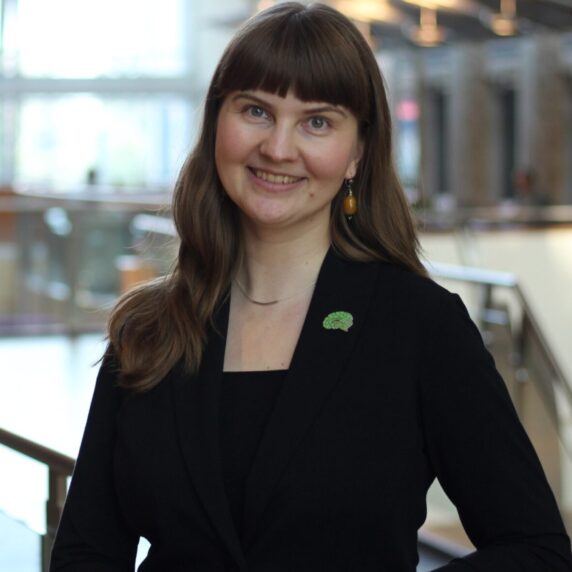2023
Anastassia Voronova
Brain repair research holds promise for multiple sclerosis, other neurological diseases

2023
Brain repair research holds promise for multiple sclerosis, other neurological diseases

Neural stem cell biologist Anastassia Voronova and her research team at the University of Alberta are trying to teach new tricks to older brains.
“We study how neural stem cells build and repair the brain,” she says. “Stem cells build the brain during fetal development, so my idea is that if we can understand how they built the brain in the first place, then maybe we can understand how to wake up or mobilize stem cells in our adult brain.”
Unfortunately, these stem cells in adult brains are rather lazy, she says, when it comes to making repairs. “They just don’t want to do what they need to do, which is to replace damaged or lost cells.”
Her promising work has garnered Dr. Voronova the 2023 Sloan Fellowship.
“By understanding how stem cells build and maintain the brain, we can figure out how to hijack those molecular pathways that were once important in development and use this information to encourage adult neural stem cells to replace cells that are lost in neurological disorders.” Specifically, the team studies how neural stem cells can be harnessed in multiple sclerosis and neurodevelopmental disorders such as autism spectrum disorder.
Dr. Voronova, holder of a Canada Research Chair in Neural Stem Cell Biology, has shown how the molecules naturally present in the brain activate neural stem cells to potentially halt and even reverse the effects of multiple sclerosis and other neurological diseases for which there is currently no cure. She also studies how aberrant neural stem cells contribute to the development and progression of neurodevelopmental and neurodegenerative disorders.
“In my lab we try to translate developmental discoveries to real pharmacological treatments. We use preclinical mouse models of multiple sclerosis and neurodevelopmental disorders. We aim to fill the gap between basic discovery and clinical research, but we draw all of our inspiration from basic research, which I think is really important to highlight.”
“The Sloan Fellowship is specifically for fundamental basic research. That’s significant because without fundamental discoveries in basic research, it’s really hard to translate anything into clinical applications.”
The recognition of the Sloan Fellowship is “really reassuring,” she says. “It affirms that what you’re doing is high quality, innovative, creative and has a lot of potential. The Sloan Fellowship really underscores how important it is to have that curiosity. What we try to do is to translate the discoveries coming out of our curiosity into tangible outcomes for patients down the road.”